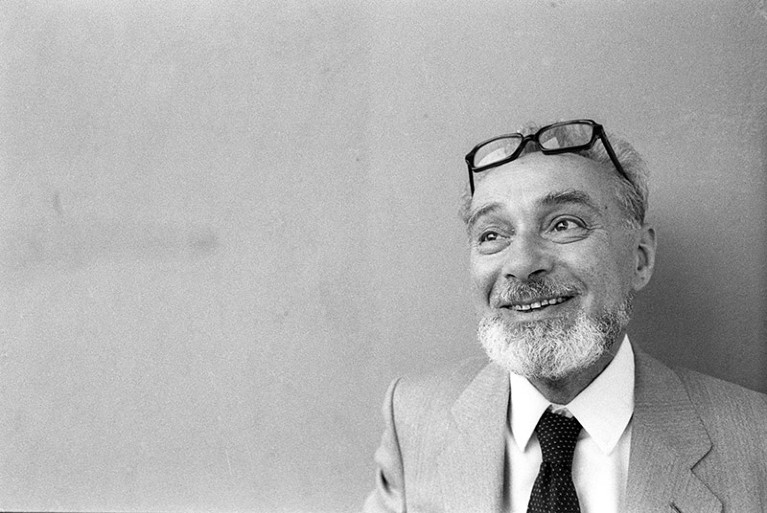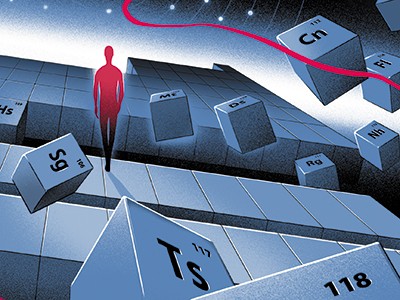
Primo Levi, literary alchemist and Auschwitz survivor.Credit: Marcello Mencarini/Bridgeman
In The Periodic Table, Primo Levi — scientist, poet, writer — makes chemistry a metaphor for his life. But it becomes more than that. Chemistry shapes his life, defines his life, in Auschwitz even saves his life. It becomes his living. In the end, chemistry becomes everything: life itself.
When, in 1985, I reviewed Raymond Rosenthal’s translation of Levi’s collection of short stories (by then a decade old), I called it gold. I wish I’d also said what I thought at the time: that this was a book that people would still be reading in 100 years. With each re-reading, the chapters based on memoir seem even more perceptive, more profound.
Western European history is embedded in the work’s brief time span, from Levi’s student years to the post-war recovery of Italy. Each title of the very different 21 tales is the name of an element at that story’s core, sustaining the architecture of a book that delivers a sharp sense of the compulsion, ambiguities and delights of science.
Nature special: The periodic table
His narrative briefly invokes the rise of fascism, the folly of British Prime Minister Neville Chamberlain at Munich, the fall of Prague, General Francisco Franco’s conquest of Spanish Republican forces in Barcelona, the sustained bleakness of all-out war in the 1940s, the nightmare of the concentration camps and the cruel post-war struggles to survive and rebuild.
Literary references are scattered through, among them Thomas Mann’s The Magic Mountain, Emile Zola’s Germinal and the work of fellow Italian–Jewish political exile, writer and physician Carlo Levi. But the narrative stubbornly returns to elemental chemistry. He recalls in the story ‘Iron’ the moment he learnt while conducting assays that to conquer matter is to understand it; and that that knowledge — he calls it the missing link between the worlds of words and of things — is in turn central to understanding the Universe. For him, the periodic table was “poetry, loftier and more solemn than all the poetry we had swallowed down in liceo [secondary school], and come to think of it, it even rhymed!”
Elemental struggles
Levi was born in Turin in 1919. What narrative there is begins with his ancestry, peopled by individuals “noble, inert and rare”, but poor compared with “other illustrious Jewish communities in Italy and Europe”. The story is ‘Argon’, from the Greek for inactive. His memories of barbe and magne (uncles and aunts in the dialect of his native region, Piedmont) become a reflection on words, in Hebrew and Yiddish too. The links between obdurate matter and precarious survival become more intimate with time, as he graduates, begins a career, finds ways just to stay alive. The realization that zinc samples must be impure to yield to acid triggers an insight into the importance of difference and the new place of the Jewish people in fascist Italy under Benito Mussolini, who ruled from 1922 to 1943. “Dissension, diversity, the grain of salt and mustard are needed.” Fascism, however, “wants everybody to be the same and you are not”.
Resistance to fascism in Italy was something of a buffer against the country’s fascist racial laws. Levi achieved a first-class honours degree in chemistry. An unnamed military officer then gave him an enigmatic and ultimately futile job in faraway, unidentified hills, to see if he could extract value from the tailings of an asbestos mine. In ‘Nickel’, this rooting in rubble prompts another hymn to matter. “The entrails of the earth swarm with gnomes,” he writes. The word nickel is even derived from the German for ‘little demon’ — creatures that might “let you find a treasure beneath the tip of your pickax, or deceive and bedazzle you, making modest pyrites glitter like gold”.
After the collapse of Italian fascism in 1943, Nazi divisions occupied Milan and Turin. Levi joined the partisans, and was betrayed. Imprisoned in Italy’s Republic of Salò, a German puppet state, he was subsequently shipped to Auschwitz. Here, his chemistry degree and ability to speak German saved him — for slave work at the Buna rubber factory. To avoid starvation, he secretly made fatty acids by oxidizing paraffin, tried to make fritters of cotton and forced himself to ingest glycerine. He identified and stole iron–cerium rods found in the laboratory. Whittled down to make cigarette lighter flints, these were bartered: “This is how we won the bread which kept us alive until the arrival of the Russians.”
In his 1947 memoir If This Is A Man, Levi had written unforgettably of the crazy market forces in the camps, one of the great testaments of cruelty, shame and despair in mid-century Europe. The stories of The Periodic Table are poignant, acute and more shaped. In one casual sentence in ‘Vanadium’, he recounts how, decades after the war, when he was working with an industrial-varnish business, he found himself dealing with a German from the Auschwitz factory. As he wrote, “reality is always more complex than invention: less kempt, cruder, less rounded out”. But crude, unkempt experience is transmuted in this book. Literary alchemy is at work. In the 2002 biography Primo Levi, Ian Thompson notes that, in some ways, the closest Levi came to being a novelist was in the “daring and original” The Periodic Table, and nowhere more so than in ‘Vanadium’.
‘Silver’ exemplifies that originality, too. It includes a little detective story, told by a fellow chemist, of how intermittent batches of silver nitrate papers supplied for X-ray imagery were spoilt. Mystery solved, Levi declares his ambition to seek more stories of luck, intuition and stratagems on which the working chemist relies, stories “in which stolid matter manifests a cunning intent upon evil and obstruction, as if revolted against the order dear to man”. In the post-war wreckage of Italy, he finds plenty of obstruction. A down-at-heel factory manager in ‘Nitrogen’ commissions him to identify the unguent that renders lipstick ‘kiss proof’. He decides the starting point must be uric acid. The search ends with Levi and his bride trying to amass urea from chicken dung and python excrement.
Such visceral realities are the lesson of the chemist’s trade, he writes. “Matter is matter, neither noble nor vile, infinitely transformable, and its proximate origin is of no importance whatsoever.” The book ends with the imagined odyssey of an atom of carbon, from calcium carbonate to carbon dioxide to leaf tissue, to glucose and ultimately to the pulse of energy in the hand that holds the pen.
Levi died in 1987, after falling from the third-storey landing of his Turin home. His book lives on, a chemist’s book, a hymn to the elements and a testament to what he calls “the strong and bitter flavour of our trade”.
I have four anthologies of science writing on my shelves. Levi is in all four, and his matchless short story ‘Carbon’ in three. I think people will still be reading The Periodic Table in 2085.

 Anniversary celebrations are due for Mendeleev’s periodic table
Anniversary celebrations are due for Mendeleev’s periodic table
 Extreme chemistry: experiments at the edge of the periodic table
Extreme chemistry: experiments at the edge of the periodic table
 Can quantum ideas explain chemistry’s greatest icon?
Can quantum ideas explain chemistry’s greatest icon?
 Celebrate the women behind the periodic table
Celebrate the women behind the periodic table
 More than 2,000 years of elements: a prehistory of the periodic table
More than 2,000 years of elements: a prehistory of the periodic table
 The first synthetic element
The first synthetic element
 Futures SF: Elementary school
Futures SF: Elementary school
 Artistic alchemy
Artistic alchemy
 Q&A: Chemical connector
Q&A: Chemical connector
 In Retrospect: Calvino's Cosmicomics
In Retrospect: Calvino's Cosmicomics








